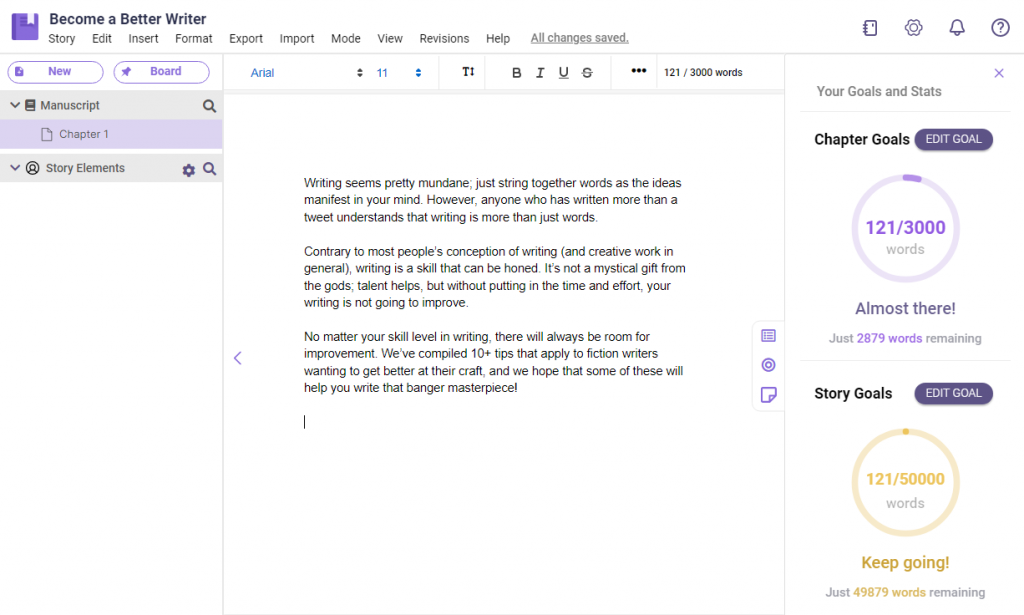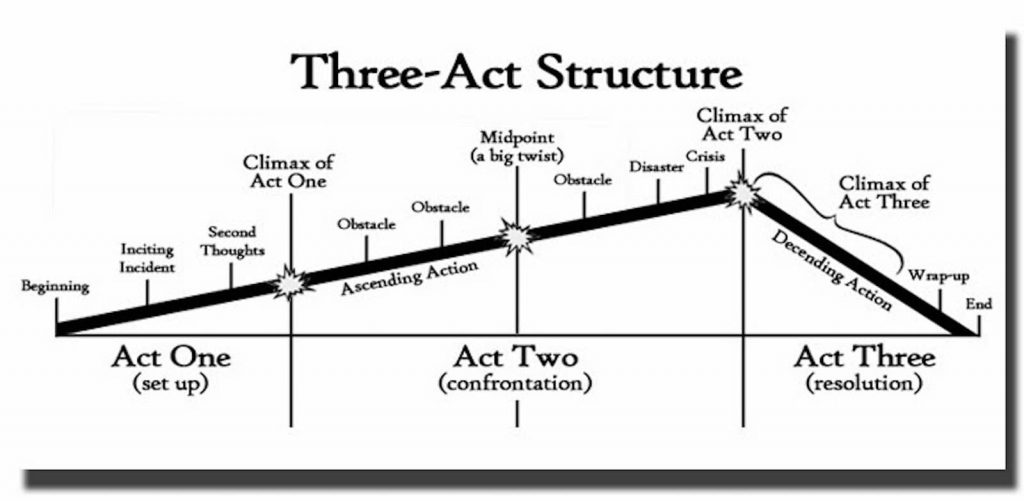How to Become a Better Writer in 2022

Writing seems pretty mundane; just string together words as the ideas manifest in your mind. However, anyone who has written more than a tweet understands that writing is more than just words.

Contrary to most people’s conception of writing (and creative work in general), writing is a skill that can be honed. It’s not a mystical gift from the gods; talent helps, but without putting in the time and effort, your writing is not going to improve.
No matter your skill level in writing, there will always be room for improvement. We’ve compiled 10+ tips that apply to fiction writers wanting to get better at their craft, and we hope that some of these will help you write that banger masterpiece!
Tips to Become a Better Writer
Read. Read. Read.
The repetition should highlight how much reading is valued to make yourself a better writer. We consider reading to be a part of the writing process: even without ever dropping a word to paper, you are actively finding ways to improve your writing.
What are the things that you want to look out for when reading? For starters, you can dissect another writer’s style: you can study their vocabulary, structure, and rhythm as you go through their work. On a higher level, take notes on how they pace plot points and develop the story, how they introduce major characters, and how all elements come together into one cohesive narration.

Even if the story ends up being a bit too bad or uninteresting, you can still learn from its mistakes. Note the parts that made the novel particularly bad, and try to see how you could avoid doing that for your novel.
We recommend reading nonfiction as a fiction author, too! Despite the difference in genres, fiction authors can learn brevity from nonfiction books. Although they are also quite dissimilar, topic structure can be easily related to plot structure, helping you solidify its development in a logical sense.
Write Consistently
Well, this is a no-brainer. To become a better writer, you want to write as much as you can. However, not many people understand the importance of writing consistently. Writing is a skill; the most effective way to improve it is to exercise it and work on it every day.
Yes, every day.
The key to writing consistently is discipline. You don’t just “find time” for writing. You will end up never having time for it. Instead, you have to actively carve it into your daily schedule. You don’t even have to write a thousand words every time; any effort spent into improving is a step closer to becoming a better writer.
However, if you are planning to embark on a long writing process, such as writing a full-fledged novel, you have to spend more than an hour on writing. You have to determine a deadline and honor it, and the only way to do that is to write every day.

If you are feeling uninspired for the day, don’t let go of the pen and instead write on side projects. Aside from distracting you away from the main project, you might also gain new ideas that will then fuel you to write back on your manuscript.
If you want a bit of a push, try aiming for word count goals. LivingWriter can help you with that. Our Story Goals feature allows you to choose an end date for your manuscript, which will then automatically calculate the required number of words you have to hit per day. Plus, we also take into consideration your vacation days, so that you can still take breaks now and then.

Study Structure and Writing Theories
Thankfully, many people have published a lot of learning materials that new writers can consume to make their writing better. Specifically, reading about popular story frameworks, such as the Three Act Structure and the Story Circle, helps you understand effective plot pacing and development, supported by centuries’ worth of storytelling.

Aside from plot structure, you can also study the technical side of writing. Brush up on your grammar. Learn new literary devices. There’s a lot to learn in writing, and you’d be hard-pressed to be out of material for it. Becoming a better writer is a continuous process of learning new things every day.
Be Clear and Concise
Take notes from the nonfiction books that you have read from Tip 1. It is tempting to over-deliver by stuffing paragraphs with flowery words that have 4 syllables or more. However, more often than not, these extra words are just it: extra.
It just so happens that clarity often comes together with conciseness, so cutting off meaningless words from your manuscript will also make your story easier to understand. Keeping your word count economical and tight also lends more power to your prose, as readers get to the good stuff right away without plowing through the thick bush of superfluous writing.

There is, of course, a bit of artistry and poetry in every prose we want to compose, and if you intend to deliver a draft shaped by a wordsmith’s craft, then by all means, but don’t make it routine. Beautiful prose is undeniably impressive, but it will not make up for a poorly developed plot.
Finish The Draft
Sometimes, we can be too pressed to focus on perfection, settling on nothing but a perfect manuscript on the first draft. However, that is nigh impossible; perfection is not having a lucky shot on the first try. It’s a process of developing something unpolished into the best form it can be.
However, there’s nothing to polish if you don’t ever finish the draft. So push your perfectionist self away from the writing process, and let the creative mind fuel your writing without being inhibited by the prospect of being imperfect.
Eliminate distractions that stop you from ever stopping to write. If you ever feel like procrastinating, embrace it but manage it responsibly. Accommodate things that pop in once in a while that cripple your writing, but always keep your deadline sacred and your goal word counts workable.
Write with the Reader in Mind
We write because we have a lot of ideas that we want to express, but in the midst of that, we might lose sight of the receiving end of these ideas. At that point, writing becomes pointless: what use is a book that does not acknowledge its readers?
To become a better writer, you need to respect the reader, their expectations, and the time they would spend reading your book. Always think of what the reader would think of as you write your manuscript. If you’ve spent four paragraphs describing the setting that you’ve painstakingly researched, maybe you should cut it down before the reader drops your book at the point.

Another way to think about this is: write what you would also want to read as a reader. If you don’t want to read through copious amounts of exposition, then don’t, even though you’ve had enough material to fill chapters with it.
Show, Don’t Tell
The age-old writing tip, “show, don’t tell,” is true and ever so applicable now as much as it was back then. By showing the readers what is happening, you trigger their imaginations to conjure the images by themselves. Your story prompts the reader to imagine the world you’ve described in their minds, making it alive in their heads. The better you show the world, the more immersed readers are in your world.
Telling the readers makes the conjured world flat and uninteresting as if it was just an image. To be a better writer, trust your reader to know enough that you don’t have to spoon-feed all the details.
Self-edit with no Mercy
After tucking your perfectionist self away from the writing phase, it’s time to let them out ferociously once you’re done with the draft. Your first manuscript will be dirty, and it will be dirtier as you edit it. However, think of it as chipping away the rock from the diamond.
A good starting point to edit your work is to read it out loud. This can help you pick out awkward-sounding sentences and jarring phrases that don’t seem to fit well into the narrative. It also helps to give you a good idea of how your story flows lexically.
There will be parts to edit, entire paragraphs to rewrite, characters to be reimagined, and maybe better ideas to add. If they fit better into your novel, you might as well do your best in editing, as much as you did your best writing it.
Ask for Feedback from Peers and/or An Editor
Rarely is the first shot the right one. The same is true for your manuscript. However, even your most voracious editor self will not be able to catch the mistakes that your writer self wrote for months. The best source of feedback will always be third parties.

You can do the first pass with your close peers and relatives. They may not be professional editors, but they will spot basic mistakes like inconsistent details and glaring plot holes in your story. They can also offer new ideas about characters and plot development, pick out weak points in your story that might need to be strengthened, and such.
If you can, you can then proceed to hire a professional editor. These people will pick out every minute detail that’s off the mark, and your manuscript will be sent back with many notes for revision. However, you will thank them later for helping your manuscript become the best it could become.
Accept Constructive Criticism
‘Tis the way of becoming a better writer to hear praises and criticisms about your work. After all, nothing is ever everyone’s cup of tea. However, that shouldn’t stop you from taking constructive criticism kindly; there will always be room for improvement for everyone, no matter the skill level.
Constructive criticism never attacks the writer directly but instead highlights points in the story that could be better. By acknowledging and accepting these critiques, you try to improve upon your writing so that you can release a better piece the next time around.
Don’t feel offended by criticism; they are given by people who saw the potential in your writing and want you to improve as a writer.
The Technical Tips
- Write with strong verbs and fewer adjectives. By emphasizing action rather than description, your writing becomes concise and every bit of a sentence impactful.
- Avoid clichés. Read through your genre and understand which clichés are shunned and should be avoided.
- Avoid throat-clearing or adding superfluous introductions. Get to the good stuff right at the get-go to capture the readers’ attention.
- Introduce variation in your writing. Whether it be in words or sentence length, varying them in a rhythmically sound way can make your prose poetic in a sense.
- Corollary to the previous point, cut off repetitive phrases in your novel. Change them up or remove them entirely.
- Use an active voice as much as possible. The active voice is more impactful, clearer, and more concise in telling a compelling story.
- Avoid basic mistakes like misusing “their” and “they’re” and other similarly misused groups of words. These mistakes are easy to catch once you’re editing your work, but if left unnoticed, they will make your novel amateurish and unpolished.
Be a Better Writer Starting Today
As highlighted by many of our tips, becoming a better writer is not a switch that you can just flip on or off. It is a long, arduous process of improving on your writing, day in and day out, that might never end. However, as long as you follow these tips, you’re sure to be on your way to be a better writer than you were before.
Of course, LivingWriter can help you ease the journey of becoming a better writer, with its powerful features that are sure to help out writers in every aspect of storywriting. Try LivingWriter now!